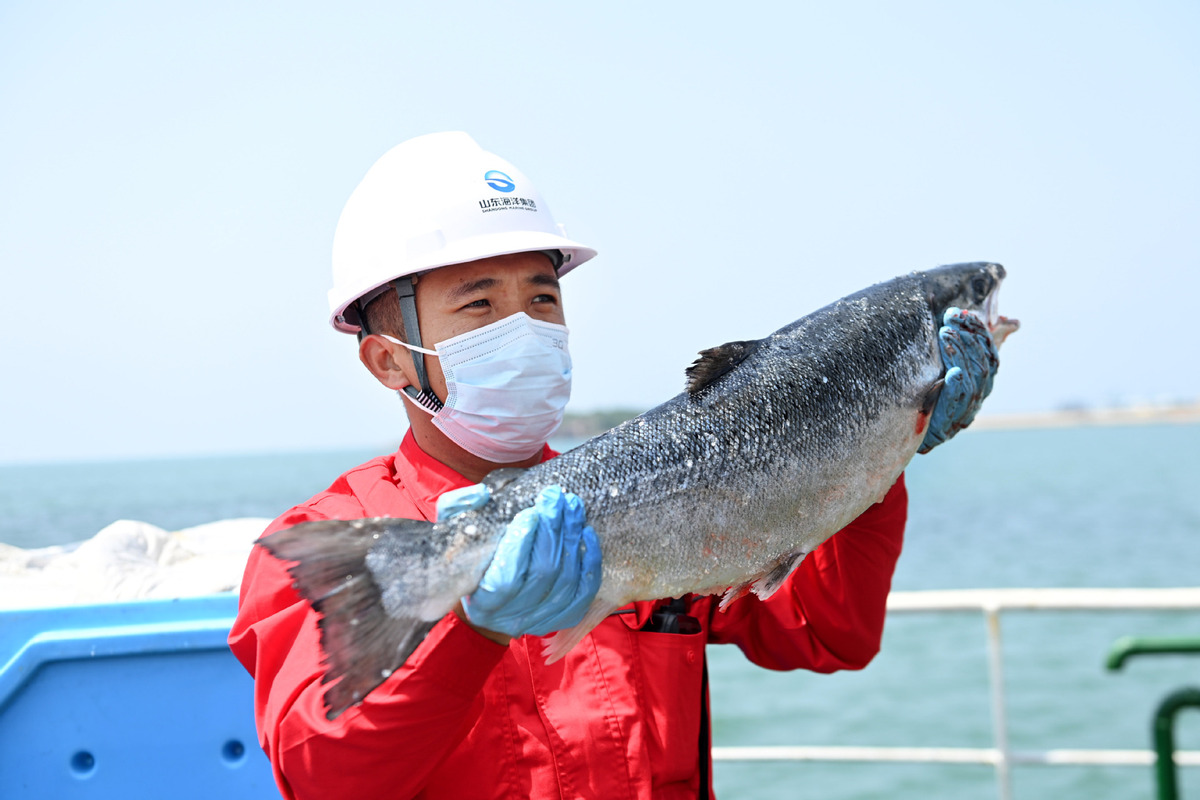Salmon thrive in deep-sea farm off Shandong
By ZHAO RUIXUE in Jinan and XIE CHUANJIAO in Qingdao, Shandong | CHINA DAILY | Updated: 2022-06-17 07:45

China's first deep-sea fish farm, Shenlan 1-located in waters 120 nautical miles (222 kilometers) off Qingdao, Shandong province-has for the first time harvested cold-water Atlantic salmon that it cultivated.
The harvest last week proves that China has the scientific and technical ability to expand aquaculture far from shore, the provincial agricultural authority said.
China's coastal waters are generally shallow and warm and not suitable for cold-water species.
However, off Qingdao, a mass of relatively cold water-roughly 500 billion cubic meters in areas of the Yellow Sea-enables salmon breeding, said Dong Shuanglin, a professor at Ocean University of China in Qingdao and a member of the expert team focusing on salmon cultivation.
"The temperature, quality and dissolved oxygen of the cold water provide favorable conditions for salmon," Dong said.
The volume of Shenlan 1-an octagonal, submersible cage made of netting and weighing 1,500 metric tons-is equivalent to 40 standard swimming pools. It is able to rise or descend according to variations in water temperature.
"In summer, we can dive it to a depth of 25 meters, where the cold-water mass is located, while in autumn, when the surface water is colder, we can lift it to the surface, thus ensuring that the fish live in a sound environment all year," Dong said.
Yan Jun, deputy director of the Southern Marine Science and Engineering Guangdong Laboratory, one of the designers of the farm, said Shenlan 1 is "constantly being renovated and upgraded to be more practical, efficient and intelligent".
Breeding conditions at the offshore fish farm can be managed by smart monitoring systems and a remote information transmission system.
"The smart systems enable realtime monitoring of the living conditions of the fish, including their shape and size. Based on the data received, staff members can adjust feeding at any time," Yan said.
In June last year, the farm harvested 150,000 adult salmon of another species, the first to be harvested after the facility's completion. Last week, it harvested its first Atlantic salmon, which is always well received in the marketplace.
China has major growth potential for salmon consumption, according to a report released in April by Joyvio Food, a Beijing-based company that is engaged in the breeding, processing and sales of aquatic products.
The per capita annual consumption of salmon in China is about 0.06 kilogram, while in Norway, Sweden and Finland, the amount varies from 6 to 8 kilograms, the report said.
Captive farming of salmon domestically will reduce logistics and labor costs, said Li Hong, vice-chairman of Deep and Far Sea Green Aquaculture, the Shandong company that runs the sea farm's salmon business.
"Compared with transporting salmon from abroad, which usually requires three or four days, salmon bred domestically will be fresher. The cold water will produce fish of better quality, including fish less prone to disease," Li said.
In the future, the company will integrate shipment, marine equipment fabrication, fish breeding, marine farming and cold-chain transportation to develop modern ocean aquaculture, he said.























